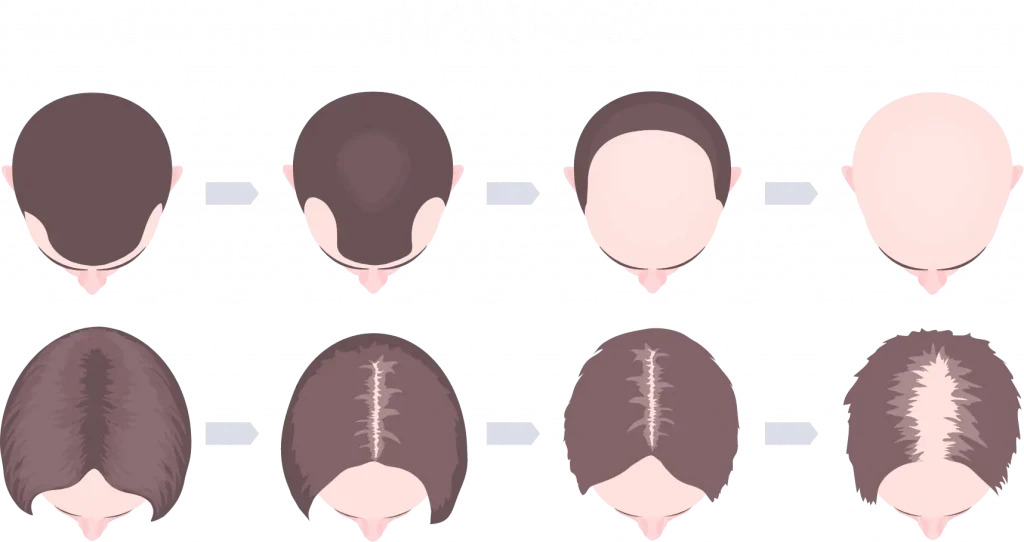What can be causing my hair loss? Stress, genetics, poor diet, and environmental toxins all compromise hair health. When it comes to our hair loss restorative treatment, our goal is to get to the root cause of these issues, improving your hair growth from within. If hair loss begins earlier than age 40, this is likely due to excessive conversion of testosterone to dihydrotestosterone also known as DHT. If hair loss begins after age 40, the cause is more likely to be related to poor thyroid function, protein deficiency, and/or stress.

Is DHT hormone harmful to my hair health? DHT can be a double-edged sword because it is the predominant male hormone responsible for a male’s sex drive but can also lead to hair loss when too much DHT is present in our blood. Most physicians will treat hair loss with Propecia and Finasteride, which is dangerous because Finasteride can kill your sex drive permanently.
On the other hand, we like to use effective and proven natural remedies as an alternative and which don’t come with the array of side effects of these hardcore drugs. Since DHT is responsible for the male sex drive and Propecia medications decrease DHT, this means literally choosing between your sex drive or your hair loss.
However, in some rare and lucky cases, we have seen patients who take Propecia without experiencing a decreased sex drive, but don’t be discouraged; hair loss can be treated with other medications/supplements like thyroid hormones, progesterone, saw palmetto, or our latest breakthrough Nutrafol + GHK-CU peptide therapy.
GHK-CU has been shown in clinical studies to increase hair follicle size and inhibit hair follicle death. Not only does it play a significant role in regenerating hair growth, but it can also make your existing hair look and feel thicker. This peptide can also be used as a cosmetic anti-aging skin product. Oxidative stress disrupted copper homeostasis, and neuroinflammation due to overproduction of pro-inflammatory cytokines are considered leading causative factors in the development of age-associated neurodegenerative conditions, and aging skin. Studies have shown that this copper peptide promotes the production of collagen and elastin in your skin, and helps firm, smooth, and soften the skin quicker than most other anti-aging skincare products. Human plasma levels of GHK-Cu is about 220 ug/ml at the age of 20, and by the time you’re between your 50’s & 60’s, levels drop to 80 ug/ml. It also accelerates wound-healing of the skin, hair follicles, gastrointestinal tract. GHK-Cu is mainly used for cosmetics due to its ability to increase collagen by 70% and decrease wrinkles by 36%. The peptide has been shown to work significantly better than vitamin C and retinoic acid prescriptions.
Peptides can completely change every aspect of our bodies and our health. Both peptides and proteins are made up of strings of the body’s basic building blocks – amino acids – and held together by peptide bonds. In basic terms, the difference is that peptides are made up of smaller chains of amino acids than proteins. We know peptides are the future of medications for the reasons of being more selective, more potent, and safer because when a peptide eventually breaks down, and when it does, it just breaks down into amino acids, and amino acids are food, basically.
Clear Test Results
Months 1-2
Reduction in hair loss, improvement in hair quality and thickness. Additional benefits include reduction of stress levels and improvement of skin health
Months 3-5
Further Reduction in hair loss. Thicker and fuller hair plus new hair growth. Additional benefits include further reduction of stress levels and improvement of skin health.
Months 6 +
New hair growth in thinning areas and further hair and skin health improvement. Hair loss prevention and skin anti-aging benefits.

